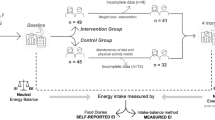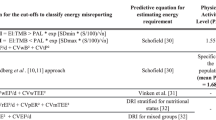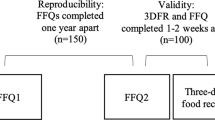Abstract
OBJECTIVE: To study the determinants and nature of dietary underreporting in a free-living population. DESIGN: Cross-sectional study of nutritional and behavioural characteristics. SUBJECTS: 1030 weight-stable subjects, 501 women and 529 men older than 15 y, included in the Fleurbaix Laventie Ville Santé study. MEASUREMENTS: Dietary intake was assessed using a 3 d dietary record. Self assessed body weight and height were also recorded. Behavioural and socio-economic data were obtained from a questionnaire. Underreporters were defined as people with a reported ratio of energy intake to estimated basal metabolic rate lower than 1.05. RESULTS: Underreporting concerned 16% of the population and was significantly more frequent in obese than in non obese subjects (P<0.001). Underreporting was significantly associated with a high socio-professional class (P<0.05), having dieted at least once (P<0.01) and to be in dietary restraint (P<0.05). Furthermore, the contribution of protein to energy intake was significantly higher in underreporters than in non underreporters, independently of weight status. CONCLUSIONS: These data underline that underreporting may bias the assessment of energy and macronutrient intake, particularly in studies on obesity and dietary restraint. Questions about weight concern, dieting and dietary restraint may be useful to identify subjects who underestimate their food intake.
This is a preview of subscription content, access via your institution
Access options
Subscribe to this journal
Receive 12 print issues and online access
$259.00 per year
only $21.58 per issue
Buy this article
- Purchase on SpringerLink
- Instant access to full article PDF
Prices may be subject to local taxes which are calculated during checkout
Similar content being viewed by others
Author information
Authors and Affiliations
Rights and permissions
About this article
Cite this article
Lafay, L., Basdevant, A., Charles, MA. et al. Determinants and nature of dietary underreporting in a free-living population: the Fleurbaix Laventie Ville Santé (FLVS) study. Int J Obes 21, 567–573 (1997). https://doi.org/10.1038/sj.ijo.0800443
Received:
Revised:
Accepted:
Issue Date:
DOI: https://doi.org/10.1038/sj.ijo.0800443
Keywords
This article is cited by
-
Soft drink intake is associated with weight gain, regardless of physical activity levels: the health workers cohort study
International Journal of Behavioral Nutrition and Physical Activity (2020)
-
Machine learning techniques in eating behavior e-coaching
Personal and Ubiquitous Computing (2017)
-
Underreporting in obese inpatients undergoing a psycho-nutritional rehabilitative program
Eating and Weight Disorders - Studies on Anorexia, Bulimia and Obesity (2013)
-
Eating out, weight and weight gain. A cross-sectional and prospective analysis in the context of the EPIC-PANACEA study
International Journal of Obesity (2011)
-
Association of obesity risk SNPs in PCSK1with insulin sensitivity and proinsulin conversion
BMC Medical Genetics (2010)



